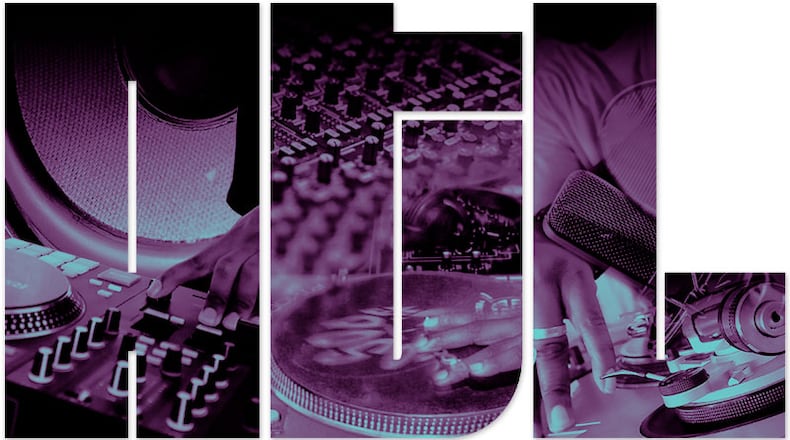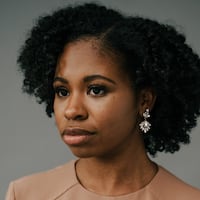When producer Zaytoven first heard the lyrical testimonials of Atlanta hip-hop artists such as Outkast, Goodie Mob, Pastor Troy and Ghetto Mafia, he sensed a familiar spirituality in their secular music. “Even though they were talking about Cadillacs and whatever else, it just still had that southern soul [and] spiritual feel to it,” the son of a preacher and choir director said.
“Church is almost the same thing. It’s talked about a little [differently] but it’s still people getting up and testifying about what God has done for them,” Zaytoven added. “[God] brought them from a raggedy car to a Mercedes-Benz or blessed [them] with a new house. It’s the same thing, almost.”
The Atlanta-raised church organist and producer, who rose to prominence in the early 2000s making melodic, bass-heavy beats for trap artists such as Gucci Mane (“Icy”), Migos (“Versace”) and Future (“Lay Up”), said he unintentionally “piggybacked” off sounds of the early rap pioneers in the city.
Credit: Tyson Horne
Credit: Tyson Horne
Since the early aughts – and thanks to the help of trap pioneers like Zaytoven – Atlanta’s trap music has been a leading subgenre within rap music. Artists such as T.I., Jeezy, Gucci Mane, Migos, Future and Lil Baby have pushed the genre to become a dominant sound in popular music at large.
The 50th anniversary of hip-hop has spurred concerts and reflective articles about the significance of rap music, but these retrospectives would be incomplete without acknowledging the impact Atlanta has had on the genre, dating back to the 1990s. As Atlanta’s sound has evolved to include eras of crunk, snap, trap and more, experts say the sounds of soul music and the vivid tales of southern Black experiences have remained consistent throughlines.
“In Atlanta, I don’t really feel like there’s one sound that you can say really encompasses the whole breadth of work from the artists that have come out of the city. It’s always evolving, ever-changing, on the zeitgeist,” Amber Grimes, executive vice president and general manager of the Atlanta-based label LVRN, said.
The Atlanta native, who remembers her first cassette tape being Tag Team’s “Whoomp! (There It Is),” credits the lack of major labels and music businesses in Atlanta with pushing the city to establish itself in a way that felt both novel and unique. “We don’t have a bunch of people walking around in suits telling us the rules of music or of the business,” she said. “Because we don’t know the rules, we have spent the last 30-plus years breaking them.”
Despite the presence of 1980s rappers such as Mojo, hip-hop scholar Charlie Braxton said Atlanta didn’t become nationally known for its rap music until the ‘90s. This was due to the rise of acts like Outkast and Goodie Mob, anchored by the soulful musical production of trio Organized Noize. Braxton said this production style featured the “beat of the boom bap with the extra [electronic drum machine] 808 bass that we like, mixed with soulful melodies.”
Braxton says there are five major epicenters of rap in the south: Miami, Memphis, New Orleans, Houston and Atlanta. In the 1990s, Atlanta’s artists and nightlife pulled from the sounds of cities in the south – including popular sub genres such as the booty-shaking, Freaknik staple “Miami bass” – but also from New York and Los Angeles. Prominent DJ Lil Jon would spend the latter half of the decade making waves with his brand of crunk music, which was inspired by the aggressive style of club music from Memphis, rural Georgia and Alabama.
Still, Braxton said Organized Noize’s music during this decade pulled from Atlanta’s soul and funk scene. Notably, Organized Noize producer Sleepy Brown is the son of saxophonist Jimmy Brown of Atlanta-based R&B/funk band Brick, famous for the hit 1976 song “Dazz.”
“Atlanta had the blessing of having a music industry carried over from the ‘60s and ‘70s with The S.O.S. Band [and] Brick. There’s a direct connection, and what made OutKast and the Dungeon Family so brilliant was they took all of these elements that are distinctly Southern, distinctly Georgia and distinctly Atlanta, and they blended them into their own form of hip-hop, instead of trying to be like and sound like New Yorkers. They were authentically themselves,” Braxton said.
Despite the locals at the forefront of Atlanta’s hip-hop scene, scholars like Braxton say the city’s reputation for welcoming transplants has also played a major role in its musical identity. “I think that we are the most collaborative city,” Grimes said.
“When you welcome people from other states with open arms and not beef, you learn a lot. You say, ‘How can I take a little bit of this and a little bit of that, but still stay true to what I do and what our Atlanta roots are?’ That’s how you end up making something new that people have never heard before. You’re not reinventing the wheel but you’re fusing a lot of things together to make something that sounds interesting and then we get to put a name on it.”
As rap music in Atlanta music grows older, Braxton predicts the city will “dig into its historical roots” and revisit the soulful, funky rap sounds of the ‘90s. Regardless, the testimonial lyrics Zaytoven has come to love will likely remain at the center of it all.
“Trap is hustling music more than anything, whether you’re selling a haircut, weed out [of] the trap house, T-shirts, or [it’s] waterboys selling water on the corner. That’s always going to be around because people always have to hustle to make money,” the producer said. “That’s something that’s not going anywhere.”
About the Author
Keep Reading
The Latest
Featured




